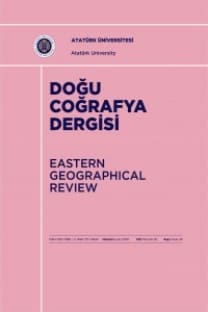Sosyo-Ekonomik Kriterler Bakımından Türkiye, Dogu Avrupa ve Kafkas Ülkelerinin Karsılastırılması
Bu araştırmada yakın tarihsel dönemde farklı sosyo-ekonomik bir süreç geçiren Türkiye ile Türkiye’nin kuzeyinde yer alan Doğu Avrupa ve Kafkas ülkelerinin 1995-2005 yılları arasında göstermiş oldukları gelişmeler 21 sosyoekonomik kriter esas alınarak incelenmiştir. İncelenmeye konu olan 17 ülke “Hiyerarsik Küme Analizi” adı verilen istatistik yöntem kullanılarak analiz edilmiş ve özellikle Türkiye’nin bu ülkelere göre konumu ortaya konmaya çalışılmıstır. Bulunan sonuçlara göre Türkiye her iki dönemde de (1995 ve 2005) bu ülkelerden hiç birine bir benzerlik göstermemektedir. 1995 yılında Rusya dışındaki Doğu Avrupa ülkeleri ve Kafkas ülkeleri genelde iki ayrı grup olarak ortaya çıkarken, 2005 yılında Doğu Avrupa ülkelerinin birbirlerine daha çok benzemeye başladıkları ve Rusya’nın da bu gruba yaklaştığı buna karşılık Kafkas ülkelerinin Doğu Avrupa ülkelerinden daha da uzaklaştığı görülmektedir. Türkiye bazı veriler açısından özellikle Kafkas ülkelerine göre daha iyi bir durumda iken, bazı veriler açısından ise Dogu Avrupa ülkelerinin seviyesine ulaşamamıştır. Bu nedenle Türkiye’nin sosyo-ekonomik gelisimin hızlandırması gerekmektedir.
The Comparison of Turkey, Eastern Europe and Caucasus Countries from the Points of Socio-economic Criteria
In this study, the socio-economic variables of Turkey and its northern neighbours (Eastern European and Caucasus countries) which have different socio-economic process in recent period and the developments these countries have shown between the years 1995-2005 are examined. This research is based on 21 variables collected in the years 1995 and 2005. Turkey’s place among 17 countries is analyzed by using hierarchical cluster technique. With this analysis Turkey’s position, from the socio-economic point of view, is determined. The finding results have shown that Turkey has a very different position the other countries as this was illustrated by the statistical data in 1995 and 2005. Moreover, this study has also shown that there emerged two groups; the first, the Eastern European countries except Russia and the second, Caucasus countries. This situation however was to change in 2005 as in the case while the Eastern European countries have shown similar socio-economic progress and Russia was able to lessen the economic distance with them the economic gap between Eastern Europe and Caucasus was widely opened. In comparison with the Caucasus countries while Turkey’s position is better in some variables its socio-economic progress is less developed from many variables than the Eastern European countries. It is for this reason that Turkey should speed up its socio-economic development.
___
- Carr, E. H., (Çeviren: Orhan Suda), 1989, Sovyet Rusya Tarihi Bolşevik Devrimi 1917- 1923, Metis Yayınları, istanbul.
- De Blij, H.J., 1993, Human Geography: Culture, Society, and Space, John Wiley & Sons Inc., New York.
- Demirbugan, A., 2005, “Doğu Avrupa Ve Bagımsız Devletler Topluluğu Ülkelerinin Ekonomik Dönüşüm Sürecinde Temel Eğilimler”, Afyon Kocatepe Üniversitesi, İ.İ.B.F. Dergisi,C.Vıı ,S.2, 165-179.
- Johnston, R., 1978, Multivariate Statistical Methods in Geography, Longman, London.
- Katsiaouni, O., Gorniak, J., 2001, "Globalisation and Rural Poverty in Transition Economies”, Poverty Eradication and Employment Section, Department of Economic and Social Affairs, United Nations, 8-9 November 2001, New York.
- Kepenek, Y., Yentürk, N., 2001, Türkiye Ekonomisi, Remzi Kitabevi, İstanbul
- Koç, S., 2001, “Türkiye’de İllerin Sosyo-Ekonomik Özelliklere Göre Sınıflandırılması”, Çukurova Üniversitesi 5. Ulusal Ekonometri ve İstatistik Sempozyumu Yayınlanmış Teblig), Çukurova Üniversitesi, Adana.
- Mc Grew, J.C., Monroe, C.B., 1993, Statistical Problem Solving İn Geography, Ww C.Brown Publishers, Oxford-England.
- Roceska, S., 2000, “Poverty, Unemployment and Social Stability in the Countries of South Eastern Europe”, Developpement et Droits de l’Homme, IAOS, Montreux.
- Sandal, E.S., Karabulut, M., Gürbüz, M., 2005, “Sosyo-Ekonomik Kriterler Bakımından Türkiye’nin Konumu ve Avrupa Birliği”, Fırat Üniversitesi Sosyal Bilimler Dergisi, Cilt:15, Sayı:1, s. 1-14.
- Şahin, H., 2002, Türkiye Ekonomisi, Ezgi Kitabevi, Bursa.
- TÜİK, 1995-2006 yılları arasındaki çesitli istatistiki veriler (CD ortamında), Ankara
- Tümertekin, E., Özgüç N., 1997, Ekonomik Coğrafya, Çantay Kitabevi, İstanbul.
- Uludağ, İ., 1992, Sovyetler Birliği Sonrası Bağımsız Türk Cumhuriyetleri ve Türk Gruplarının Sosyo-Ekonomik Analizi Türkiye ile İlişkileri, TOBB (Türkiye Odalar ve Borsalar Birliği), Minpa Matbaacılık, İstabul.
- UNDP., 1997, Human Development Report 1997, Oxford University Press, New York.
- UNDP., 2000, Human Development Report 2000, Oxford University Press, New York.
- UNDP., 2006, Human Development Report 2006, Palgrave Macmillan , New York.
- UNDP., 2007, Human Development Report 2007/2008, Palgrave Macmillan , New York.
- ISSN: 1302-7956
- Yayın Aralığı: Yılda 2 Sayı
- Başlangıç: 1995
- Yayıncı: Prof.Dr. İbrahim Fevzi ŞAHİN
Sayıdaki Diğer Makaleler
Erzincan İli'nin Turizm Potansiyeli ve İldeki Ekoturizm Uygulamaları
Bir Kültürel Cografya Çalışması: Iğdır’da Nevruz
Yarpuz Çayı Havzası’nda Yayla Yerlesmeleri
Deprem Konutları ve Adapazarı Şehri’nin Gelişmesine Etkisi
Sultandagı İlçesi’nde Tarımsal Arazi Kullanımı ve Planlama Önerileri
Sosyo-Ekonomik Kriterler Bakımından Türkiye, Dogu Avrupa ve Kafkas Ülkelerinin Karsılastırılması
Çivril’de Seker Pancarı Tarımının Cografi Özellikleri
Mülteci Hareketleri Açısından Van Kentinin Durumu ve Kentteki Mültecilerin Demografik Profili
